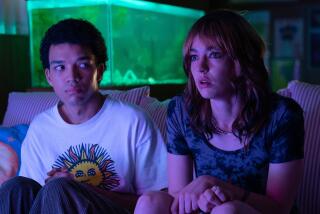Smart, likable-- and a liar
- Share via
We take you now to the weekly staff meeting at the New Republic, a major player in American political journalism, a publication that likes to think of itself as “the in-flight magazine of Air Force One.” Associate editor and resident wunderkind Stephen Glass has just regaled everyone with a description of yet another irresistible upcoming story. “Where,” one jealous colleague whispers to another, “does he find all these people?”
Long story short: He made them up.
Before Jayson Blair’s flair for creativity wreaked havoc at the New York Times, there was Glass, who in 1998 admitted to fabricating all or parts of 27 of the 41 stories he wrote for the magazine, as well as others he freelanced for George, Harper’s and Rolling Stone.
Since journalists are notoriously obsessed with their own affairs, it’s to be expected that a motion picture based on l’affaire Glass would be essential viewing in media circles. What is a most pleasant surprise is how emotionally involving a story writer-director Billy Ray has fashioned, how he’s turned “Shattered Glass” into a film for anyone who cares about strong drama.
For Ray, a journalism school dropout who’s based his script on a Vanity Fair article by Buzz Bissinger as well as original interviewing, understands that this is not just a cautionary tale about the failure of systems. It’s a persuasive study in personality, a story that explores the dynamics of human behavior that allowed Glass to so succeed at seriously bamboozling his peers that some of his colleagues at the magazine threatened to quit if he was fired even after he was exposed.
Because he was confident he had a strong story, Ray, who’s had a variety of screenwriting credits (“Volcano,” “Hart’s War”) but has never directed before, knew he didn’t have to hype things with excessive directorial style. His tone throughout is coolly realistic and evenhanded, and his actors -- including Hayden Christensen, Peter Sarsgaard, Chloe Sevigny, Steve Zahn, Melanie Lynskey, Hank Azaria and the director Ted Kotcheff in a forceful cameo as publisher Martin Peretz -- confidently play it the same way.
It’s Christensen, best known as Anakin Skywalker in the latest “Star Wars” films and no doubt grateful for a chance to work in a dramatically significant project, who holds us in his power with his mesmerizing portrait of the Great Fabricator.
The youngest journalist at the New Republic, at 24, Christensen’s Glass looks even younger than that as he scurries shoeless around the magazine’s offices, a shy, boyish smile on his face, a thoughtful compliment on his lips.
Always helpful, ever solicitous of others and possessed of a gift for small gestures, Glass has a genius for getting people on his side. As he says in a fantasy colloquy with a high school journalism class, “There’s so many showoffs in journalism, so many braggarts and jerks, even a little self-effacement stands out.”
When it came to his own ideas and his own stories, Glass was the picture of self-denigration. “It’s stupid, I know, I’ll probably just kill it,” was his typical response to praise. He was a master at hyping his own stories without seeming to, at using a show of humility to make himself the lost puppy everyone wanted to adopt, especially the soft-hearted folks around the office, composite characters like Caitlin (Sevigny) and Amy (Lynskey of “Heavenly Creatures”). Glass is so good at this technique, we can feel it working on us even though we know he’s not to be trusted.
Not that there weren’t signs of what was going on. Glass’ first editor, Michael Kelly (Azaria), catches him in errors, but Glass counters his suspicions with the technique of over-apologizing for small mistakes. He has such a superb sense of tactical balance and situational behavior, of knowing just how much ground he has to give and what he has to say, that in another life he could have been a major Hollywood player.
Not even Kelly’s departure and the arrival of new editor Chuck Lane (a forceful Sarsgaard) throws Glass off stride. But when an online reporter for another publication (Zahn in a deft noncomic role) starts investigating one of Glass’ stories, Lane, initially not the most popular of editors, is forced to confront both the situation and his reporter.
More than being a smart and accurate look at magazine journalism -- no small matter -- “Shattered Glass” is also a compelling portrait of a psychosis at work. Wisely not even attempting to understand why Glass did what he did, the film is more concerned with showing us how this could have happened. “Journalism is the art of capturing behavior,” Glass says at one point, and that’s what’s been done to exceptional effect here.
*
‘Shattered Glass’
MPAA rating: PG-13, for language, sexual references and brief drug use.
Times guidelines: Adult subject matter.
Hayden Christensen...Stephen Glass
Peter Sarsgaard...Chuck Lane
Hank Azaria...Michael Kelly
Chloe Sevigny...Caitlin Avey
Melanie Lynskey...Amy Brand
Steve Zahn...Adam Penenberg
A Cruise/Wagner Productions and Baumgarten Merims production in association with Forest Park Pictures, reIeased by Lions Gate Films. Director Billy Ray. Producers Craig Baumgarten, Adam Merims, Gaye Hirsch, Tove Christensen. Executive producers Tom Cruise, Paula Wagner, Michael Paseornek, Tom Ortenberg. Screenplay Billy Ray, based on the article by Buzz Bissinger. Cinematographer Mandy Walker. Editor Jeffrey Ford. Costumes Renee April. Music Mychael Danna. Production design Francois Seguin. Art director Pierre Perrault. Key set decorator Anne Galea. Running time: 1 hour, 43 minutes.
In limited release.
More to Read
Only good movies
Get the Indie Focus newsletter, Mark Olsen's weekly guide to the world of cinema.
You may occasionally receive promotional content from the Los Angeles Times.











